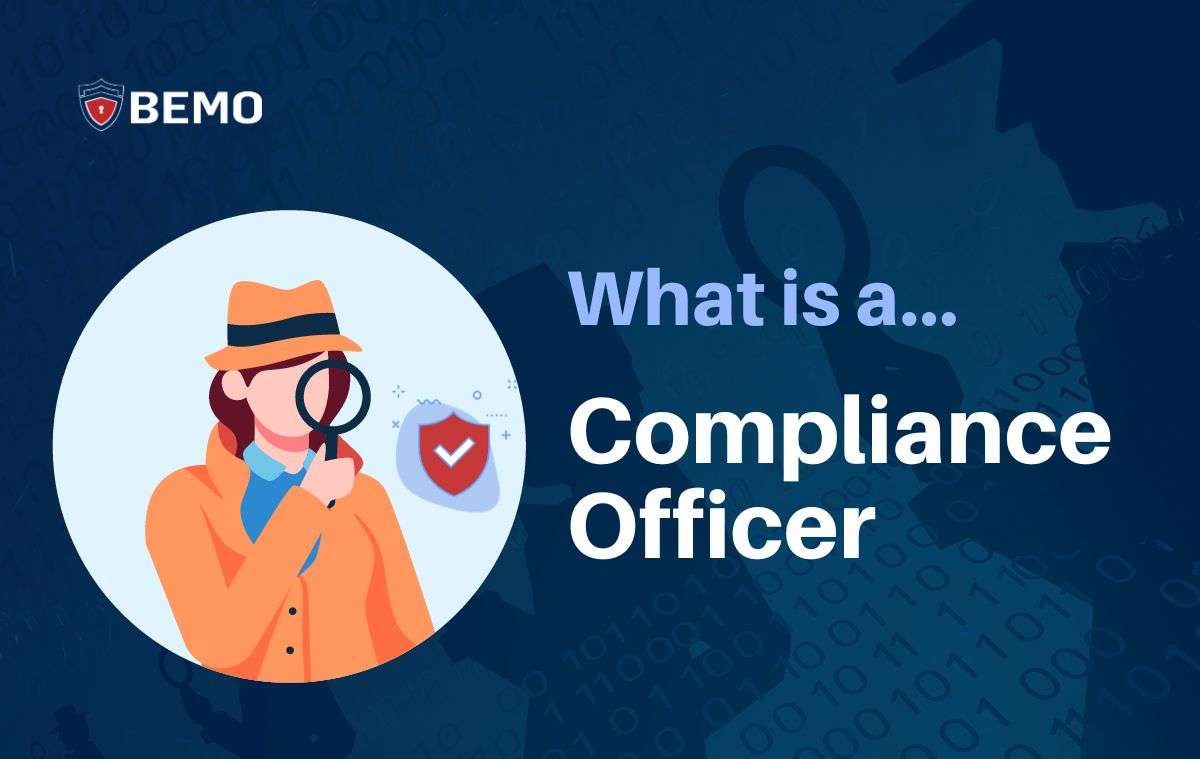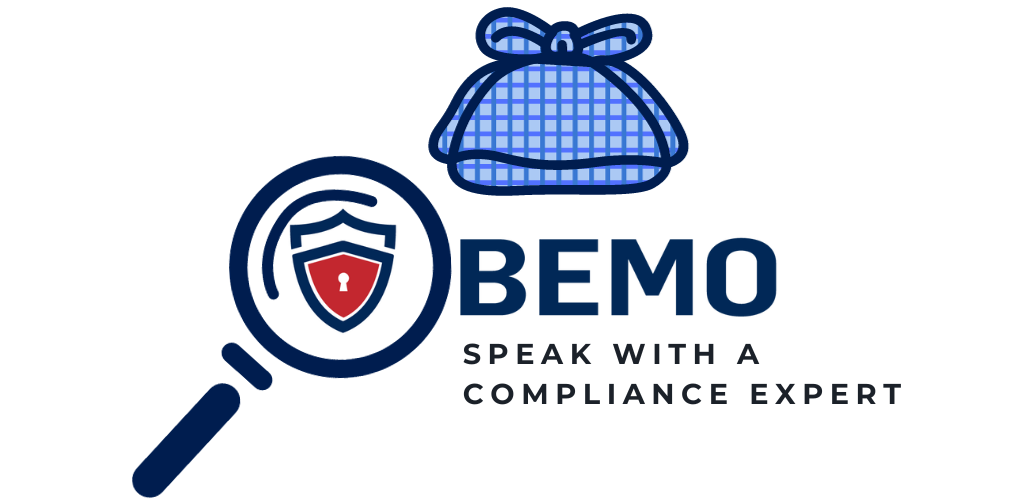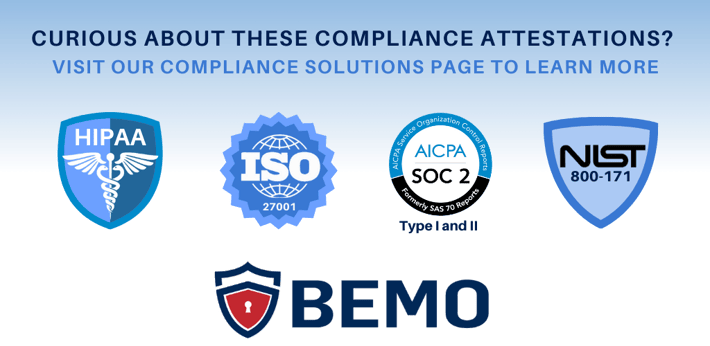
In the world of business regulations, where laws and guidelines can become as complex as a mystery, there exists a steadfast guardian – the Compliance Officer. But who is this mysterious figure, and what exactly do they do?
In this blog post we will decode the role of a Compliance Officer so you can understand exactly what they do and if you need one.
- Definition of a Compliance Officer
- What Does a Compliance Officer Do?
- Compliance Officer vs Chief Compliance Officer
- Why BEMO is Your Best Compliance Provider Choice
Definition of a Compliance Officer
At its core, a Compliance Officer is the Sherlock Holmes of a company. They are the keen-eyed detective whose mission is to ensure that a company follows all the rules and regulations applicable to its industry. In simple terms, they search for clues of non-compliance and fix them.
So, while compliance is all about adhering to specific regulations, laws, or industry standards, sometimes, in the pursuit of security, companies might inadvertently overstep boundaries, potentially violating compliance requirements; this is where a Compliance Officer plays a pivotal role.
They serve as the intermediary between security measures and compliance with regulations, guaranteeing that the company operates securely while also abiding by the law and meeting all required guidelines and regulations.
If the lines between security and compliance still feel blurry, read our article on Security vs Compliance to understand the difference between them.
What Does a Compliance Officer Do?
Now that we have our detective hat on, let's delve into the day-to-day duties and responsibilities of a Compliance Officer. Imagine them as the vigilant detectives who guard the company's integrity.
Here are some key tasks they undertake:
Top Four Responsibilities of a Compliance Officer
- Rule Interpreter: A Compliance Officer must translate the convoluted language of laws and regulations into plain English for everyone in the company to comprehend.
- Policy Enforcer: They ensure that the company's policies and procedures align with legal requirements and industry standards, thwarting any unethical or risky behavior.
- Risk Mitigator: Compliance Officers identify and assess potential risks and then formulate strategies to minimize these risks. When a compliance issue arises, officers investigate, collect evidence, and suggest corrective actions, similar to solving a case.
- Training Guru: They conduct training sessions to educate employees about compliance issues and the importance of following the rules.
.jpg?width=880&height=880&name=what%20does%20a%20compliance%20officer%20do%20(1).jpg)
But why is a Compliance Officer so crucial for a company? Picture a mystery novel without a detective – the plot would unravel into chaos, the criminal would roam freely, and justice wouldn't be served. Similarly, a company without a Compliance Officer, risks wandering into legal and ethical minefields.
Having a Compliance Officer helps companies steer clear of legal trouble, reducing the risk of costly fines and legal disputes. They safeguard the company's reputation by ensuring it operates with integrity, which is invaluable for attracting customers and partners. Compliance makes the company more efficient and less prone to errors.
Compliance Officer vs. Chief Compliance Officer
Now, let's dissect the difference between a Compliance Officer and a Chief Compliance Officer (CCO) while sticking to our detective analogy. They are part of the same team, one handling specific cases and the other overseeing the entire detective agency.
|
|
CCO |
Compliance Officer |
|
Hierarchy |
Holds a higher rank, often reporting directly to the CEO |
Typically holds a |
|
Role |
Develops and implements |
Primarily handles day to day compliance tasks and |
|
Communication |
Communicates compliance matters to the board of directors, executive team, |
Communicates compliance related matters to relevant departments, ensuring they understand and follow regulations and company |
|
Scope of Responsibility |
Supervises all detective |
Focuses on specific areas |
Why BEMO is Your Best Compliance Provider Choice
Now, if you're a small or medium-sized business without the resources for a full-fledged detective team or your own dedicated Compliance Officer, the challenges can be overwhelming, and the risks of non-compliance too great. What you need is external assistance.
Enter the solution – a "Compliance Provider." Consider compliance providers as consulting detective agencies, stepping in when you don't have an in-house detective.
BEMO is more than just a provider; we're the experts who stand shoulder to shoulder with you.
- Unmatched Expertise: At BEMO, our team of seasoned compliance detectives has mastered the nuances of SMB challenges. With us, you're not merely a client; you're a collaborator in conquering compliance and cybersecurity.
- Microsoft Excellence: As a Microsoft Partner of the Year winner, we bring to your SMB a wealth of knowledge in harnessing Microsoft technologies to fortify your compliance and cybersecurity efforts. We're not just experts; we're industry leaders.
- Tailored Solutions: We understand that each SMB is unique. BEMO doesn't offer one-size-fits-all solutions. Instead, we work closely with you, comprehending your business's distinct needs; customize our strategies to align with your goals and your budget.
By partnering with a Compliance Provider, you can navigate the intricate world of detective work without depleting your resources. Sit back, relax and let us solve your case.  Whether you've been on the market for a long time or you’re a small start-up, compliance is a crucial aspect of modern business. Understanding the role of a Compliance Officer is the first step toward a compliant and prosperous future for your business.
Whether you've been on the market for a long time or you’re a small start-up, compliance is a crucial aspect of modern business. Understanding the role of a Compliance Officer is the first step toward a compliant and prosperous future for your business.
Top 10 Posts
-
Windows 10 Pro vs Enterprise
-
Migrate From Gmail to Office 365: Step-By-Step Guide
-
Windows 10 Enterprise E3 vs E5: What's the Difference?
-
What are the 4 types of Microsoft Active Directory?
-
How to Migrate from GoDaddy to Office 365
-
Google Workspace to Office 365 Migration: A Step-by-Step Guide
-
How to Set Up Office 365 Advanced Threat Protection
-
10 Benefits of Microsoft Teams
-
Top 3 Reasons to Move From Google Drive to Microsoft OneDrive
-
How to remove Office 365 from GoDaddy (tips and tricks)
-2.png?width=1080&height=1080&name=Untitled%20design%20(5)-2.png)




Leave us a comment!